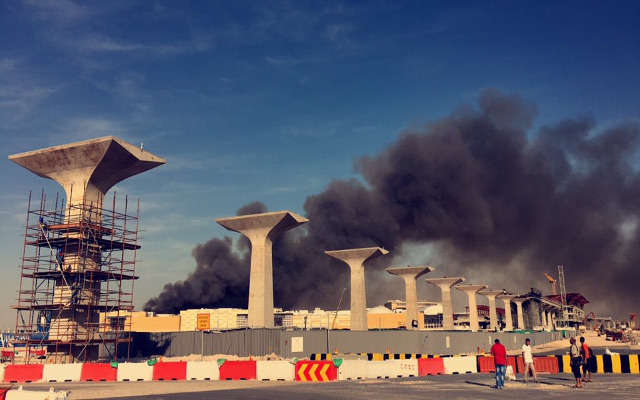On 20 July 2016, a fire broke out at the construction site of Tawar Mall near Al Duhail, Qatar. Hundreds of construction workers, most of them migrant workers, evacuated the site. While the Qatari Ministry of Interior reported no casualties, it remains unclear whether the thick, black smoke that billowed from the scene affected any of the workers. This fire is a recent example of the unsafe working conditions many migrant workers are subjected to every day. Unsafe working conditions are only some of the abuses employers force their laborers to endure. By subjecting their workers to forced labor conditions, employers are contributing to human trafficking in Qatar.
Fires at construction sites are not uncommon in Qatar. In April 2016, a fire also broke out at a mall near the Al-Rayan Sports Club in Doha. The causes for both fires remain undetermined. Doha News commented on the incident, saying that blazes are “common” during the hot months in Qatar.
In addition to the threat of fire, migrant workers at construction sites endure a number of other abuses and hazards while on the job. One worker spoke about his worksite: “What’s even worse is the on-site safety, or lack of it. It does not exist, and my friends and I, who went to work there together, were horrified at the risks taken every day on the site.” Employers often force their employees to work long hours in harsh conditions, often outside, where they breathe in unsafe, sandy air. Some workers in Qatar reported their employers denied them free drinking water while working outside in the desert during the summer.
The abuses workers face at the construction sites often continue into their living accommodations. According to the Qatari Ministry of Development Planning and Statistics, about 1.4 million people, nearly 60 percent of Qatar’s population, live in labor camps. Migrants living in these labor camps are subject to cramped, unsanitary, and dangerous conditions. Amnesty International’s Qatar researcher, Mustafa Qadri, described the labor camps in an interview as “rudimentary concrete buildings stinking of sewage with dirty, appalling kitchens, and bathrooms which sometimes don’t even have toilet doors or sinks.”
In 2016, Sharan Burrow, General Secretary of the International Trade Union Confederation detailed many of the abuses in labor camps, stating, “open cooking plates, faulty electrical wiring, gas bottles where they shouldn’t be – these are hazards that those who are forced to live in labor camps have to face each day, on top of their often dangerous and unhealthy working environment.” Additionally, like in construction sites, fires are quite common in labor camps. In May 2016, a fire at a labor camp in Abu Samra injured at least 10 people and killed 13 others. In the same month, another fire killed two workers at a labor camp in the Al-Areeq region.
Migrant construction workers are likely unable to leave these dangerous and abusive conditions as they are victims of forced labor and human trafficking. Most employers confiscate their workers’ passports upon arrival in Qatar, inhibiting migrants’ ability to leave the country. Due to the kafala system, workers need to have their employers’ permissions in order to obtain exit permits or change jobs, even if their original contract term has ended. Reports indicate most employers do not pay their workers on time, if at all. Workers in Qatar told Amnesty International that they had not been paid in months, some in as long as 10 months.
Qatar does have legislation in place in order to protect migrant workers. The general labor law that protects against exploitation, Law No. 14 of 2004 pertains to most foreign workers. The anti-trafficking law Law No. 15 of 2011, defines forced labor as human trafficking. Even the sponsorship law, Law No. 4 of 2009, provides some rights for migrants as it prohibits employers from confiscating their workers’ passports. However, Qatari officials rarely enforce these laws, leading to the unsafe work environments and rampant abuse occurring in the country.
The Government of Qatar needs to take greater steps to ensure the safety and wellbeing of the migrant workers within its borders by enforcing its laws. Authorities should reform the kafala system in order to reduce workers’ dependency upon their employers. If Qatari officials refuse to implement such actions, employers will continue to exploit their workers by exposing them to dangerous working conditions and contributing to the illegal practice of human trafficking.
Brittany Hamzy is an Advocacy Fellow at ADHRB.





